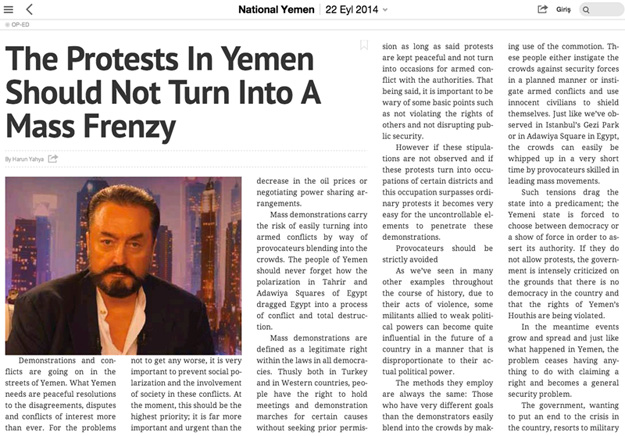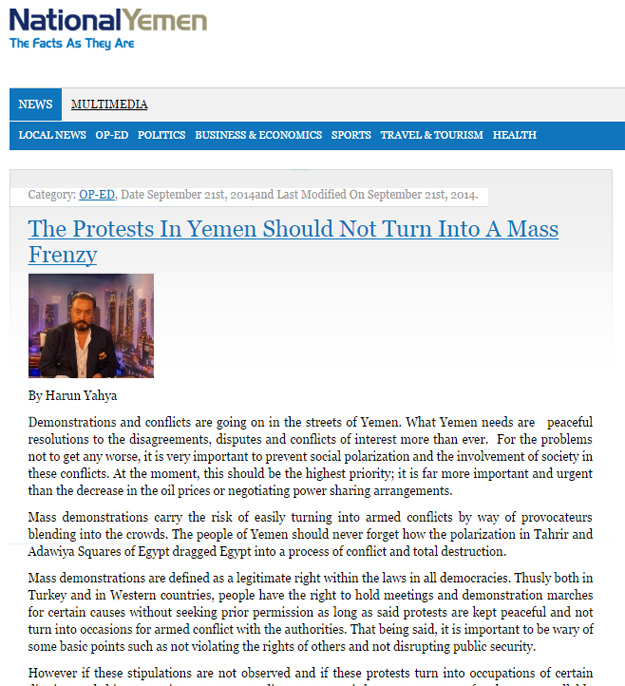

Demonstrations and conflicts are going on in the streets of Yemen. What Yemen needs are peaceful resolutions to the disagreements, disputes and conflicts of interest more than ever. For the problems not to get any worse, it is very important to prevent social polarization and the involvement of society in these conflicts. At the moment, this should be the highest priority; it is far more important and urgent than the decrease in the oil prices or negotiating power sharing arrangements.
Mass demonstrations carry the risk of easily turning into armed conflicts by way of provocateurs blending into the crowds. The people of Yemen should never forget how the polarization in Tahrir and Adawiya Squares of Egypt dragged Egypt into a process of conflict and total destruction.
Mass demonstrations are defined as a legitimate right within the laws in all democracies. Thusly both in Turkey and in Western countries, people have the right to hold meetings and demonstration marches for certain causes without seeking prior permission as long as said protests are kept peaceful and not turn into occasions for armed conflict with the authorities. That being said, it is important to be wary of some basic points such as not violating the rights of others and not disrupting public security.
However if these stipulations are not observed and if these protests turn into occupations of certain districts and this occupation surpasses ordinary protests it becomes very easy for the uncontrollable elements to penetrate these demonstrations.
Provocateurs should be strictly avoided
As we’ve seen in many other examples throughout the course of history, due to their acts of violence, some militants allied to weak political powers can become quite influential in the future of a country in a manner that is disproportionate to their actual political power.
The methods they employ are always the same: Those who have very different goals than the demonstrators easily blend into the crowds by making use of the commotion. These people either instigate the crowds against security forces in a planned manner or instigate armed conflicts and use innocent civilians to shield themselves. Just like we’ve observed in Istanbul’s Gezi Park or in Adawiya Square in Egypt, the crowds can easily be whipped up in a very short time by provocateurs skilled in leading mass movements.
Such tensions drag the state into a predicament; the Yemeni state is forced to choose between democracy or a show of force in order to assert its authority. If they do not allow protests, the government is intensely criticized on the grounds that there is no democracy in the country and that the rights of Yemen’s Houthis are being violated.
In the meantime events grow and spread and just like what happened in Yemen, the problem ceases having anything to do with claiming a right and becomes a general security problem.
The government, wanting to put an end to the crisis in the country, resorts to military methods. That is because these protests become more-or-less permanent as they spread over time, just like we’re seeing right now and the ultimately disrupt the peace and stability of the country. For that reason, various security problems appear and that drags the country into a situation wherein neither the normal day-to-day activities of society nor commerce can be sustained: For example, because of conflicts near the Sana’a airport, international flights to Sana’a, the capital of Yemen, have been cancelled temporarily.
Well then, what should the states facing such angry crowds as in Yemen do and what kinds of precautions should be taken?
Everyone suffers in commotion
The Houthis especially should re-evaluate their idea of struggling for their rights from a different aspect. Once the wrongfulness of the mindset that states “there is no way out other than armed conflict” is recognized, they can easily see that there are much better, more influential and easier ways to achieve their goals. Rebelling for their rights, paralyzing a country, and causing the death of innocent civilians is not democracy; on the contrary it means violating the rights of others.
One should never forget that reasonable and logical thinking can only be possible in a calm and stable environment, otherwise grave problems will occur. .Panic and terror becomes widespread and many people become unable to think straight, and in such an environment, even simple matters that could easily be solved could escalate and serve as the spark that ignites a civil war.
What should be done to put an end to the problems of both the Sunnis and Houthis of Yemen is to unite Muslims under one roof at once and adopt a sincere, brotherly attitude. This is the most urgent requirement not only in Yemen, but throughout the entire Muslim world. God commands in a verse of the Qur’an as follows: “…If you do not act in this way (be friends and protectors of one another) there will be turmoil in the land and great corruption. “ (Surat Al-Anfal; 73)
Neither the Yemeni government nor the Sunni people living there should externalize Houthis; on the contrary they should embrace them, refrain from humiliating them and make them feel that they respect and love Houthis as their brothers. The problems in Yemen cannot be solved by simply ignoring the existence of the Houthis; they can only be solved by recognizing their right to exist and by recognizing not only the lifestyles of Sunni people but also that of the Houthis’ as well.
Being just, not threatening the sanctity of life and the property of others is a necessity of good morality that all Muslims, be they Sunnis or Shias, should possess.
If people among the Houthis and state officials possessing these beautiful moral values undertake their responsibilities, it would be possible to prevent the protests in Yemen from turning into a mass frenzy or worse, plunging the country into an outright civil war.
Adnan Oktar's piece on National Yemen:


